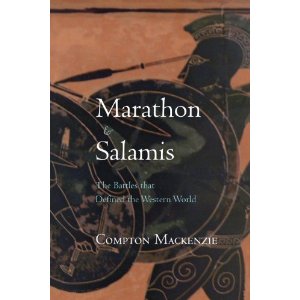|
As one of the defining moments in Western civilization, the Battle of Marathon (490 BC) has seen a considerable surge in interest over the last year as a result of the observance of its 2500th year anniversary. The overwhelming defeat by a coalition of Athenian and Plataean warriors, over a numerically superior invading Persian army has endured as a source of fascination for students of ancient history. Its military significance remains obvious in that Darius the Great’s forces were repelled by the contingent of Greeks led by the Athenian general Miltiades. However, the ramification of this victory has transcended the battlefield in that it enabled the advancement of intellectual development which continued unabated throughout an era which had since been designated the Classical Age of Greece.
To coincide with the commemoration of this landmark event, Westholme Publishing has recently reissued the Sir Compton Mackenzie book, ‘Marathon and Salamis:The Battles that Defined the Western World’. Originally published in 1934, its title upon first glance may seem like a misnomer---especially after a review of the table of contents which includes the other conflicts of the Greco-Persian Wars (490 - 479 BC) such as Thermopylae, Artemisium, Plataea and Mycale. Nevertheless, even with the inclusion of these other battles, the author has elaborated as to why he feels that Marathon and Salamis are both worthy of such lofty acclaim.
Beginning with the reasons behind the Ionian revolt and the sequence of events which eventually led to the confrontation at Marathon, Mackenzie has faithfully adapted the works of Herodotus of Halicarnassus (c. 484 BC – c. 425 BC), who is acknowledged as the primary source of information on these battles. Mackenzie’s writings have been augmented with the theories promulgated by his contemporary, the Irish historian J.A.R. Munro, whose articles were compiled under the heading ‘Observations of the Persian Wars’ (1899 -1904). One of Mr. Munro’s conclusions firmly espoused by Mackenzie was that the Battle of Marathon was fought in 491 BC, which differs from the date that has been accepted by most historians as 490 BC. Furthermore, while Herodotus never documented the number of either the Persian or Greek combatants at Marathon, Munro estimated the size of both armies, which are cited by the author as 25,000 and 11,000, respectively.
Even though there are instances where Mackenzie has contradicted Herodotus, it is obvious that he has exhibited a deep affinity for the ‘Father of History’s’ account of all of the aforementioned battles, including the defeat of the Persian navy at Salamis (480 BC) which resulted in Darius’ son, Xerxes the Great retreating back to Persia. His love for the Herodotean narratives is most apparent though when describing Marathon’s most controversial aspect --- the ‘charge’ by the Greek warriors running approximately a mile, wearing armor which it is believed to have weighed close to 70 pounds. While advocating Munro’s paper on the topic, Mackenzie has begrudgingly conceded Herodotus’ assertion that the Greeks ‘ran’ this distance as highly improbable.
However, it is with respect to this disputation where the author’s eloquence shines through in the book, wherein he states, “No ancient historian ever questioned that charge, which was extolled for its valour, not as a remarkable feat of athletics.”
Mackenzie’s 'Marathon and Salamis’ may appear dated, after all it is a book which is over three quarters of a century old. Mackenzie himself states in the ‘note’ that he can not compare with the classicists who have written about these celebrated battles. It is true that several fine examples of scholarly literature relative to the Greco-Persian Wars have been written prior and even subsequent to its original release. However, the author’s intention when writing this book was to inspire others to read Herodotus and learn about the events which helped shaped the course of both Western and Eastern civilization. Those aspirations which began over 75 years ago have continued to be met once again with the reprint of this title detailing one of the great chapters in ancient Greek history.
Disclosure: A review copy was provided by the publisher, Yale University Press
|


